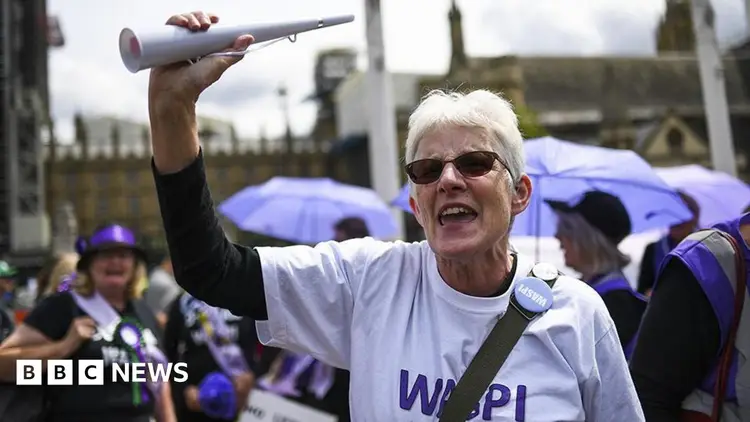Waspi: Fury as women hit by state pension age rise are denied payouts

Advocates are expressing their outrage over what they describe as the government's "unreasonable" refusal to provide compensation to women affected by alterations to the state pension age.
It is reported that 3.6 million women born in the 1950s were not adequately notified about the increase in the state pension age, which was adjusted to match that of men.
Liz Kendall, the Secretary of State for Work and Pensions, expressed regret for a 28-month hold-up in mailing out letters; however, she has dismissed the possibility of any financial compensation.
Nine months ago, a parliamentary ombudsman suggested that each individual impacted should receive compensation ranging from £1,000 to £2,950.
The Women Against State Pension Inequality (Waspi) campaign labeled the government's choice as a "slap in the face."
"Today, the government has taken an extraordinary political step by overlooking the obvious advice from an independent oversight organization," stated Angela Madden, the chair of the campaign group.
"This is an strange and completely unwarranted action that will have people questioning the purpose of an ombudsman if government officials can just disregard their rulings."
The Waspi campaign advocated for individual payments of at least £10,000.
However, Kendall mentioned that there was clear proof of a significant understanding regarding the adjustments to the retirement age. He argued that sending out letters sooner wouldn’t have impacted their ability to make decisions about retirement.
She mentioned that there was no proof of any "immediate financial harm" caused by the government's choice.
"Since most women were aware that the age for receiving the state pension was rising, the government feels that providing a uniform payment to all women, which could cost up to £10.5 billion, would not be fair or reasonable for taxpayers," she stated.
Prime Minister Sir Keir Starmer acknowledged the worries of the Waspi women but mentioned that he needed to consider if it was fair to place additional financial demands on taxpayers.
The age at which individuals can begin receiving their state pension has been rising due to the fact that people are living longer lives. Currently, both men and women can start receiving their pension at the age of 66.
For many years, men were eligible to start collecting their state pension at 65, while women could begin receiving theirs at 60.
The 1995 Pensions Act established a schedule to make the age for receiving state pensions the same for both men and women. The goal was to increase the retirement age for women to 65, with the transition set to occur gradually between 2010 and 2020.
However, the coalition government formed in 2010 chose to accelerate the process. With the implementation of the 2011 Pensions Act, the eligibility age for women was moved up from 65 to 2018.
The increases have sparked a heated debate. Activists argue that women born in the 1950s have been treated unjustly due to the swift changes and the manner in which these changes were communicated to them.
Thousands of people reported that they were unaware they would face delays in receiving their state pension, which led to significant financial and emotional stress for them.
Although the Parliamentary and Health Service Ombudsman (PHSO) has the authority to suggest compensation, it does not have the power to make it mandatory.
The Secretary of State for Work and Pensions stated that the government would take away valuable insights from the recent events. They plan to create an action plan to address the issues highlighted in the ombudsman's report and will clearly communicate any future changes regarding the state pension age.
She mentioned that upcoming pension communications will utilize "the latest techniques" to reach out to those impacted.
Steve Darling, the spokesperson for work and pensions for the Liberal Democrats, expressed his disappointment, stating, "Today marks a shameful moment for the government, which has abandoned countless women of pension age who have been wronged through no fault of their own. They are disregarding the recommendations of the independent ombudsman, and that is simply unacceptable."
The Conservatives, who chose not to address the ombudsman's findings during their time in office, had their shadow work and pensions secretary, Helen Whately, state that it's essential for ministers to "take responsibility" for the choice to withhold compensation.
Before Tuesday's announcement, a petition submitted to Parliament advocating for the establishment of a compensation system had garnered 135,000 signatures.
Subscribe to our Politics Essential newsletter to receive insightful political commentary, stay informed about key developments throughout the UK, and keep up with important events. You'll get it right in your inbox every weekday.





















































